Are your systems built for your best days or your worst days? I'm a big believer that your business should support your life, and in saying that, having systems & workflows that honor your health (even on bad days!) needs to be priority number one! In my conversation with Sandra, she shared her journey of managing her TWO businesses with a chronic illness. She shared all about the importance of setting boundaries, making changes to avoid burnout, and using SIMPLE business systems in your business.
I absolutely love our conversation and all of the valuable insights and strategies Sandra shared for wedding professionals with chronic illnesses, including the importance of having open communication with other vendors on the team and just supporting each other! She also shared a ton of tangible tips, from creating workflows (such as inquiry workflows and general client workflows) to streamlining processes and why she strives to provide information well in advance.
Whether you are suffering with a chronic illness or not, there are so many good nuggets when it comes to creating business systems and workflows that honor your health in today's episode. Enjoy!
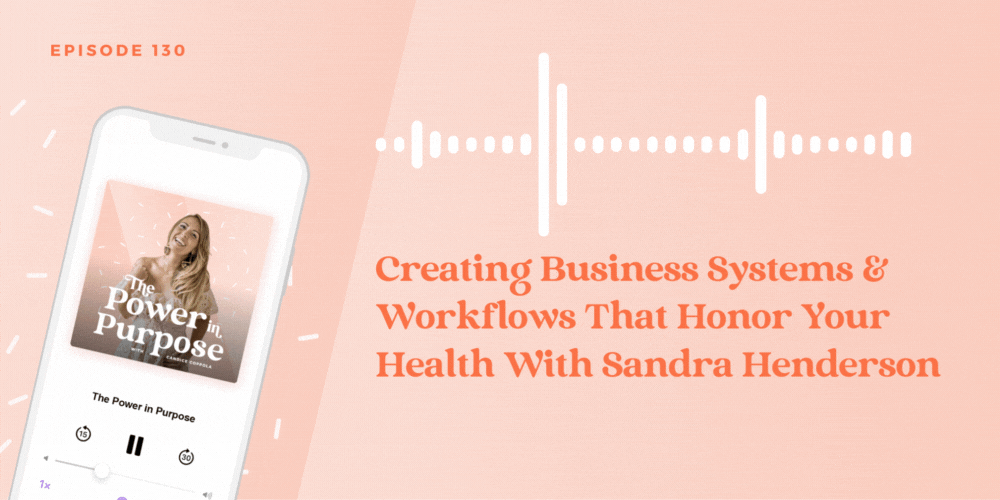
In this episode with Sandra Henderson of Simply Sandra Yvonne:
- 00:00 Introduction: Creating Systems that Honor Your Body
- 07:19 Navigating the Wedding Industry with a Chronic Illness
- 12:06 Prioritizing Health and Making Changes in Your Business
- 23:24 Building Systems for Your Worst Days
- 24:58 The Importance of an Inquiry Workflow with an Autoresponder
- 27:44 Creating a Client Workflow for Support and Communication
- 35:22 Supporting Vendors with Chronic Illnesses
- 43:48 Building Thoughtful and Supportive Systems in the Wedding Industry

About Sandra Henderson
Sandra Henderson is a photographer, systems strategist, and podcast host based in Ontario, Canada. She specializes in helping photographers create strategic systems for their businesses to help them get their time back so they can spend it doing the things they love most. As an entrepreneur who also navigates chronic illness life, Sandra takes a unique approach to using systems that will help businesses thrive no matter what life throws your way.
On a personal note, she loves tacos, all things Bravo, 90’s music, traveling, and spending time at home with her husband, stepson, and two cats!
Candice Coppola (00:02.23)
Hey Sandra, welcome to the show.
Sandra (00:05.076)
Hi, thank you so much for having me. It feels a little bit surreal to be over on this end of your podcast, I'm not gonna lie.
Candice Coppola (00:13.034)
So happy you're here. I'm so glad that you agreed to do the show to share your story and to help our listeners out. Um, I'm just so happy you're here. Sandra and I have been working together for, oh my gosh, is it been like three years at this stage? It's yeah.
Sandra (00:22.245)
Oh, me too.
Sandra (00:30.288)
Yeah, it would have been January 2021 that we first started working together.
Candice Coppola (00:35.386)
Mm-hmm. And at the time of recording, we're in March 2024. So we've been working on Sandra's business and I've been supporting Sandra for a number of years. And it's just so wonderful to be able to sit down and interview you and all your expertise and all the things that you have learned along the way and also done along the way these last couple of years, how it's all culminating and the things that you're working on now. So I'm just excited.
Sandra (01:01.069)
Oh, me too.
Candice Coppola (01:03.83)
Well, today we're talking about managing your business with a chronic illness. This is something that is really important to you, Sandra. And I have a question about your journey, which we'll start in a sec. We'll go into your story in a second. But I feel like this is a topic that people are starting to talk about. But for so many years, especially in the wedding industry, this is not something that people really shared with one another. They had a chronic illness.
And I feel like there is a whole group of folks who have, you know, health conditions or illnesses and they don't really have any place to turn to, to talk to somebody or to get ideas or to get support on how they can grow their business or maintain their business and serve their clients really well, but also honor their body.
Sandra (01:54.176)
Yeah, that is so true. It's definitely not something that, like, over the last few years as chronic illness really started, like, taking priority in my life and my business, I felt like I was alone in that. I had, like, a couple of friends that I ended up connecting with over Instagram once I started sharing my story a little bit more that they reached out, but it wasn't until actually, like...
the last year or so, but especially since threads has become a thing that I've really started seeing like how open people are about talking about running a business with chronic illness and how much people want support and just a community in that area because what works for people who don't have a chronic illness doesn't necessarily work for people who do. So it has been really nice to kind of like find my people in that way, but you are so right that it's definitely something that.
wedding vendors, photographers, business owners in general are really only just starting to open up about.
Candice Coppola (02:50.848)
Yeah.
I, it makes me happy though that we have space and we have created a place where people can connect with one another and find support and camaraderie and then also even solutions and adaptability so that they can take things and adapt them to their business and find solutions. I would love for you to share your story of chronic illness and how it affected your business. Take us through what this was like for you
years ago when you were kind of coming to terms with things and managing your business at the same time.
Sandra (03:27.764)
Yeah, of course. So ever since I started working in the wedding photography industry, we used to always joke around that we had wedding Saturdays and migraine Sundays. It was the wedding hangover that most people experience, but I have chronic migraines and so I was a complete write-off. Everybody in my life knew you're not going to see me on Sunday.
Candice Coppola (03:48.874)
Mm-hmm.
Sandra (03:48.892)
And so I was kind of used to navigating that, but around 2017, I actually remember being at a wedding and we were doing getting ready photos with the bride at a hotel. And all of a sudden I had this pain, but it was like, it was cramps, but it was like the worst cramps that I've ever had in my life. I felt like I was about to be sick. I started sweating. I had to just kind of like motion to my second tutor, like, please come and take over. I need to get out of the room for a minute. And so I just went and...
took some Tylenol, I drank some water, and after a few minutes, kind of just gained my composure and forced myself to get back to it because what other option do you have on a wedding day, right? But that was kind of the first point that I knew, like, there's something else going on here and I really need to go and see a doctor and try and get some answers. I eventually did get diagnosed with endometriosis, but it took about four years-ish to get that diagnosis, which is...
unfortunately pretty quick. It seems like a really long time, but getting a diagnosis for endometriosis can take forever because there are unfortunately not enough trained professionals who are able to make that diagnosis. Learning more about the disease after I was diagnosed, I was actually able to trace it back to when I was about 13 years old. So there is a very high likelihood I was born with this. And...
How it affected me as a wedding photographer, at first it wasn't a huge impact. I still of course had those migraine Sundays and my body was a little bit more tired, but it was in 2020 that things really sort of took a turn for me. I think a lot of it had to do with the stress that we were all under from the pandemic and just so many unknowns that it didn't give my body the chance that it needed to heal after having surgery at the end of 2019.
And after three really bad endo flares over six weeks, I started having trouble walking around my house. I was having trouble eating. I lost about 40 pounds over three months. And it was awful. I spent many days, many nights crying, wondering like, how am I going to run my business? How am I gonna shoot weddings if I can't even walk from my couch to my kitchen? But I had a...
Sandra (06:08.34)
an epiphany-like moment one day, laying in bed late at night when I couldn't sleep. And I decided that the pandemic had already temporarily shut down my business. It had taken away our ability to socialize with people. Endo had taken away my fertility and all these other things. My business was not going to be one more thing on the list of things that were being taken away from me at that point.
I'm a big person where if you tell me I can't do something, I'm going to show you how many ways that I can. So it was just like the confirmation that I needed. I was like, no, my business is not going to go on that list. So I really had to figure out a way to still succeed in my business while being able to give the respect to my body and health that I needed to.
Candice Coppola (06:38.83)
Absolutely.
Sandra (06:56.272)
And so that was when I really started leaning into systems and incorporating boundaries in my business and just really making sure that I was putting myself and my needs first and finding ways that I can keep giving back and allow my business to thrive while I do that.
Candice Coppola (07:14.771)
Hmm. You have such an inspiring story.
Sandra (07:17.171)
Well, thank you.
Candice Coppola (07:18.258)
You do. And I really feel like you have, and I have talked about many things over the last three years, many, many things. One of the things that I found really inspiring about your story too was prior to your diagnosis or maybe within the same confines of like being diagnosed with endometriosis, you were really burning out with client work and you were really maxed out, had no boundaries, were trying to do everything.
Sandra (07:41.779)
Yes.
Candice Coppola (07:48.292)
people pleasing everyone everywhere. And this kind of forced you to relook at everything in your business, including the amount of work you were taking and the style of work and how you were working with your clients too and make some big changes.
Sandra (08:04.252)
Mm-hmm. Yeah, I went into 2019. I started the year, it would have been March actually like roughly right around now I my husband actually had to call me from work because I was in hysterics I was like I'm gonna have to close down my business. I can't do this. My clients aren't happy. I'm not happy This is not why I got into business. This is not why I start I've been doing all the work to get me to this point
Um, thankfully he talked me down. I'm here five years later, still in business. Um, so shout out to my husband for that. Um, but it was just kind of like another one of those epiphany-like moments through a cloud of tears where I decided like, no, I don't want to give up my business, it's time to make some changes. And boundaries were a big part of that because like you said, I had been burning myself out.
Candice Coppola (08:34.318)
the
Sandra (08:54.024)
year after year after year up until that point. I was delivering galleries late. I had clients who just, you know, they started their experience at really great, but by the end of it, they just wanted it to be over. And that was not the experience that I wanted my clients to have. And so yeah, boundaries were definitely a huge part of that. And I think that's what kind of like
had me dipping my toe in the water with systems, and then thankfully that kind of set me up over the next year to really have the groundwork to lean into it in 2020.
Candice Coppola (09:25.202)
Yeah, well, you didn't have a choice once you got your diagnosis and you realized that this might only get progressively worse until you have a solution to make it better and you have to figure out a way to work within the business that you love and serve your clients well, but then also honor yourself. That can be hard for anybody, whether you have a chronic illness or not, don't you think?
Sandra (09:27.241)
Mm-hmm.
Sandra (09:47.1)
Oh, absolutely. It's always, it doesn't matter who you are, it's hard to turn down that money. And so I think that it's easy for business owners in any capacity to want to fill their calendar to the extreme and take on every bit of work and not say no to people because
that just means more money in their pocket. And I remember I used to think like there's 52 weekends in a year and there's Friday, Saturday, Sunday, every weekend. And I'm not gonna try and math that in my head because math is not my strong suit, but that is a lot of weddings in a year. And I used to think that was like my goal. That's how many weddings I am capable of doing. And I think the max that I ever hit in one year was 27. And at the end of that year, I said, never again will I do this many weddings.
Candice Coppola (10:31.514)
Yeah, it takes such a physical toll on your body too. And that's one thing in the wedding industry that we talk about a lot on threads or on Instagram. And maybe we create some funny memes or we have conversations with vendor friends around the vendor table about how exhausting it is. That Sunday wedding hangover, it's just such a physical job, especially if you're at the event. It can be so physical. And then to combine burnout and then to combine a chronic illness or even
Sandra (10:34.291)
Mm-hmm.
Candice Coppola (11:01.488)
situation, you really start to question like, how long do I have in this career, in this industry? Like, how many years can I devote to it before I just completely fall apart?
Sandra (11:13.476)
That's so true. And thankfully, I went into the wedding photography industry kind of with that idea in mind already. And I think this kind of set me apart from a lot of people that I'm in the industry with was that from day one, I always knew that my time in this industry was limited. And it had nothing at that time nothing to do with my illness, but it has to do with, you know, aging out of the industry, which I don't wish it didn't happen as early as it did. Because
whole other side topic of ageism and all that kind of stuff. But there's aging out of the industry, trying to find ways to relate to your couple when you are now having kids and are closer in age to their parents, not wanting to spend as much time away from your friends and family on weekends. Like there's so many things that factor into it that I think people just need to have like a realistic look at.
Candice Coppola (12:05.206)
You're right, and have a realistic conversation with themselves about the amount of years they want to devote to it, how much they can devote physically, what feels like a good age to look at expanding your options for a career or your business, which is something I don't think we talk about enough. And then, too, if something were to happen to you, how would you be able to honor your commitments? One of the challenging parts about being in this industry
Sandra (12:07.979)
Mm-hmm.
Sandra (12:26.965)
Mm-hmm.
Candice Coppola (12:35.12)
Like we sign our lives away for years in advance. You're guaranteeing your presence for someone's event. If you're a planner, photographer, videographer, florist, you are guaranteeing that you are gonna show up and be there. And who's to say where your life is gonna take you a year from now, especially with your health?
Sandra (12:53.792)
Yeah, that's so, so true. That's something that gave me a lot of anxiety when I was first starting out, trying to navigate chronic illness with running a business. But it's one of those things that you kind of have to make peace with, like chronic illness or not, you never know what is coming. And so it's definitely important to make sure that you have, I want to say SOPs and things like that, just an operating manual. And that's not...
not something that I ever had set up until I started working with you, Candice. And yeah, I'm so glad that knock on wood, nothing ever happened to my business before that, because my poor husband would have been in shambles trying to figure out what to do.
Candice Coppola (13:30.052)
Yeah.
Candice Coppola (13:34.182)
Oh my God, for sure. Just, yeah, 100%. So let's talk about, I feel like we've covered a lot of our bases here just in talking about the different scenarios somebody might find themselves in. And I'm sure there's someone listening. Maybe they do have a chronic illness. Maybe they have had a recent health scare. Maybe we just have somebody listening who's going on maternity leave and literally is freaking out about how their business is going to survive a month off, which PS, you should be taking more time off if you're going on maternity leave. But that's a whole nother conversation.
another day. Many of our listeners might think they have a system, but what do you think is currently missing from their setups that can really help them if and when they get sick, whether it's sick with COVID or the flu or actually something that might have a longer timeframe?
Sandra (14:23.68)
Yeah, I think the biggest thing is to lean into automations for sure. Um, because it's, they are, they're not as impersonal as they used to be. Automations have so many ways to be customized. And if you're using any CRM platforms like HoneyBook or anything else, you can use smart fields that are going to add in personal information and personal details for your clients. So leaning into automations is definitely a big one. I can't.
I can always remember the first time that I had like a proper workflow set up with proper automations running and I had to take the day off unexpectedly. I got hit with a flare and there was just no way I was going to be at my computer. And about, I would say like halfway through the day, I panicked because I had an email that I know needed to go out to a client for a session that was coming up that weekend. And I ran upstairs to my computer and when I popped into HoneyBook, I actually realized that the email had already sent.
I had completely forgotten that I had set it up to send automatically. And so I just got to like breathe the sigh of relief and make my way back down to the couch and just relax and enjoy the rest of my day. And so that is a perfect example of whether you have a chronic illness or maybe you have young kids that get sick unexpectedly or anything like that. Like just being able to take some of that work off your plate so that you don't have to worry about it on those unexpected days off is huge.
And then just also keeping things simple, making sure that you're not trying to put in a million things into every system and every workflow. My first wedding workflow, when I was using 17 hats as a CRM, it was like 75 steps long. I was including things like upload cards and backup photos. And these are things that are automatically happening with my systems. And of course, I'm gonna remember to come home and upload my photos. I don't need a reminder about that.
Candice Coppola (16:02.478)
Mm-hmm.
Candice Coppola (16:16.09)
No.
Sandra (16:16.672)
So just really like deleting things, keeping it simple, keeping it to the very basics, and the most important things that I need a reminder about was definitely key for me as well, for sure.
Candice Coppola (16:28.766)
Yeah. So maybe the first step is really kind of taking a look at your systems and asking yourself, what can be automated here so that in the event that I can't get to it or something happens, that I have those automations set up and I know it's being covered and handled. Is there anything else you think our listeners should be considering and making sure that their current workflows have if and when they get sick?
Sandra (16:35.065)
Mm-hmm.
Sandra (16:55.664)
Yeah, I definitely think that their current workflows should be... I'm going to say... taking a few times... hang on, let me start that sentence again. I'm going...
Candice Coppola (17:05.559)
Mm-hmm.
Sandra (17:09.888)
Regain. Okay, here we go. Take three. So the biggest thing, and I've said this before, and we kind of mentioned it in the last point too, is there's going to be a lot of times where you need to just stop and take an honest look at your business, what you're doing, what you're capable of, and what you're looking for going forward. So what I think is really important is to take a look at the workflows and the systems that you have set up already and make sure that they are set up in a way that
Candice Coppola (17:11.734)
Hehehehehe
Sandra (17:37.596)
is going to be manageable on your worst day and not your best day. And the reason why I say that is because on our best day, we're capable of doing anything and everything. We have, we're answering all the emails on time. We feel really good about everything we're putting out there. And so if we're building our systems for days like that.
on days when it's the total opposite, we're gonna start to fall behind and we're not gonna be able to keep up with it. That to-do list is gonna keep growing. The tasks are gonna be past due. And so when you kind of flip how you're putting those together and you're building your system for your worst day, you know that at bare minimum, no matter how you're feeling or what else you have going on, you can get these tasks done. And then on those really good days, you can just pull from your endless to-do list because every business owner has one of tasks that are just...
you know, they don't have a deadline and they just need to get done. Then on those really good days, you've got your bare minimum done. And if you have the energy, you can pull from that list or you can take some time off, you can go rest, enjoy the day. Um, and the world is your oyster after that.
Candice Coppola (18:42.822)
Oh my gosh, that is so good, Sandra. I agree 100%, very smart to think about your systems through that lens of like, how can I make this work for me on my worst day and not at my best day? Because you're totally right. Our systems perform super well when we are at our 100% optimum, our prime in a flow state working so well. But on the days where maybe your chronic illness flares up, where you have a hard day, a bad day.
you know, making sure your systems work for you during those times is what's most important.
Sandra (19:13.853)
Yeah, I definitely agree.
Candice Coppola (19:16.206)
What systems do you think every wedding pro needs to have, regardless of where they're at in the industry? What should we make sure we have a workflow for, especially like client experience focused? What are some common workflows we should be focused on?
Sandra (19:34.456)
Definitely an inquiry workflow. This is something that I see missing with a lot of my VIP clients where I'm working on their workflows with them is that they have inquiries coming in and they are just manually replying to them and doing all of that because they wanna be really hands-on and they wanna make that connection with their clients, which is awesome. But it's completely possible to do that with a workflow and using templates and automations and things like that.
So I definitely recommend an inquiry workflow that includes an auto responder. So it's sending out some information to your clients right away. We live in an age where people want information immediately. So I think it's super important to have the auto responder set up. You can send along a pricing guide if your ideal clients are wanting that pricing information first. You can send along a questionnaire if you want to do a little bit of like data mining from your clients to make sure that they are the right fit.
So there are a few different ways that you can approach that. And I always recommend also including information that is going to let these potential clients know when they are going to hear from you. Because there's absolutely nothing worse than sending in any sort of inquiry or like wanting to work with someone and then just kind of like sitting there twiddling your thumbs and not knowing what's going to happen next. So I always like to let people know when I'm in my office and how long it usually it takes me to reply to an email. So that way they're not.
not left wondering.
Candice Coppola (21:04.266)
Yeah, sales workflow is so important. When I was at the HoneyBook Partner Summit, they shared this really fascinating statistic. And it was something like 82% of leads hired the first person that responds to them. Oh, wow.
Sandra (21:20.872)
Yeah, I actually think it's higher. I think it's like 86 or something. But yeah, just based on the first person that responds. So it has nothing to do with the quality of work that they're doing, has nothing to do with the pricing or what's included. It is specifically because they were the first to respond. And so using an auto responder is the perfect way to kind of bridge that gap with being the first one to get into their inbox, but not having to be tied to your inbox 24 seven and sending those emails out yourself.
Candice Coppola (21:48.279)
Yeah.
I, it's fascinating just the, the entire sales process and how quick things are moving. They're moving even quicker now than they used to. And that feels actually kind of opposite of what everyone's experiencing because everybody feels like it's the sales process is taking longer and it feels more drawn out. But one thing I do know is, is when someone is ready to buy today, they purchase. So they make that split decision to purchase. And if you can be the fastest to respond.
And according to HoneyBook's internal data, you win that job. What are some other workflows that all wedding pros should have, chronic illness or not, but that set us up for some of the bad days that we all experience?
Sandra (22:34.208)
Yeah, I think after the inquiry workflow, the next most important would be just a general client workflow. So whether that be for your wedding clients or whatever clients you're working with, I'll give my wedding workflow as an example. I like to include touch points in that workflow that sends information to educate my clients that's going to answer questions that they have roughly around that time in the process.
Now, if they happen to ask the question earlier, then I have the template ready to go and I can just send it on their way. And I usually just, you know, encourage them with a little note, letting them know they're ahead of the game and on the ball. And that's why I hadn't sent this information out yet. But it's just a way to, again, take that work off your plate and make sure that your clients feel supported, even if you're not in your office. So I like to send out, I have a checklist that I send my clients that lets them know.
roughly the amount of time that each section of the day is going to take for taking photos. So for example, 30 minutes for family photos, usually I like to add about 45 minutes to an hour for newlywed photos. And so I break down the whole day like that. And that way it gives them an idea of exactly how much time they're going to need on the wedding day. And so it gets the idea going in their head as they're starting to finalize plans with their caterer, with their venue.
booking times with their hair and makeup, that they're gonna know how much time we need for their photos and they can schedule around that accordingly, whereas if I were to just wait and do it all with my clients right before the wedding, then all of the other times are already set in stone and I have to fit my photos in and around it to make sure that they work. So this way, it's a way of giving yourself a little bit more priority in the timeline when you're a photographer.
I will also mention the majority of my clients don't work with wedding planners. And so that is really important for my process as well, because they don't have anybody helping them with the timing. I want to make sure that I'm not being left with 30 minutes to do family photos, newly wed photos, wedding party photos, details, and then getting in for dinner. So I like to send that. I like to send out information about like ideas of what to wear for their engagement session.
Sandra (24:46.268)
some information about why a first look is a good idea and things like that. And so that way I'm touching base with my clients, but all of those emails are getting sent out automatically. So I never have to be at my computer and they're all personalized. Like I was mentioning earlier in the episode, talking about adding in smart fields. And so those will just automatically input somebody's name or wedding day or anything like that. And so they're getting a fully personalized email.
Candice Coppola (25:11.218)
Yeah, client workflow being one of the probably the most important things for you to map out. But mapping it out for your worst days and not your best, your most busiest days, your hardest days, when you're not feeling at your 100%. Such a great piece of advice that that's something that'll stick, I think, with all of us as we think about systems and workflow in our business. How do you navigate your business on days when it's hard to show up? And what would you say to somebody who's listening today who's currently in the thick of a hard day
Sandra (25:19.601)
Mm-hmm.
Candice Coppola (25:41.072)
business.
Sandra (25:43.02)
I would tell that person that it's totally okay. Your business is gonna be just fine tomorrow and you are actually going to be a better business owner and give your clients a better experience in the long run for taking that time off, allowing yourself the time to rest and just giving your body the grace and the respect that it needs.
And one thing that I like to do, because there is a lot of guilt that goes along with it, I have yet to find a way to stop the guilt from happening, so I had to just find ways to make myself feel better. Because the more stressed that we are while we're taking that time off, the longer it's going to take to feel better.
So one thing that I really like to do is I push all of my client-facing work out of the way on days when I really just don't have the mental capacity and I go into Canva. Canva is like my favourite space to live in when I'm not feeling well because it gives me a creative outlet to work on some things like graphics for projects that I have coming up and things like that without having to be doing a lot of like really intensive work.
like editing or emailing clients or anything like that. I've tried to email clients on a day when I'm having a flare and it's about as productive as if I try and email them around midnight.
I'll call somebody the wrong name. Like my brain turns to mush. My wedding planner for my wedding, I love to steal her saying where she says she turns into a pumpkin after nine o'clock. And like, that's me on a day when I'm not feeling well. Like I'm not going to be doing a lot of really productive things. So getting into Canva and just playing around, creating graphics, doing some.
Candice Coppola (26:59.036)
Mm-hmm.
Candice Coppola (27:09.564)
Mm-hmm.
Sandra (27:20.068)
just essentially like mindless creative work. I'm a very creative person. And so it's almost kind of like an art therapy for me. And it's a way to just feel like I'm putting work into my business while also taking some time off.
Candice Coppola (27:36.459)
I'm like, oh, that's a really great tip. I do that. I just don't realize I do it. And then I also don't give myself permission to do it, which is what's so great about this is our listeners probably do this when they're having a bad day. They jump to what we call like a noble task, like something that it's not do or die. It's not the top of your priority list, but it makes you happy. It makes you feel productive.
in your situation, it's creative and giving yourself permission to just live there for the day is fantastic because then you can release the guilt of all the other things. And so, you know, I'm going to give myself permission to live in Canva today, or I'm going to give myself permission to live on threads, shitposting for the day. It's all part of my marketing strategy, whatever it is, but it's the permission part that I love.
Sandra (28:27.144)
Yeah, it's so, so important. I am a huge cycle tracker. I feel like anyone who has a period, I highly recommend it, but especially if you have endometriosis. And so I always know exactly, I shouldn't say exactly when to expect to feel bad. I usually know when a bad day's coming, but there are definitely still surprise ones along the way. But actually last week, I had completely left my calendar clear.
Candice Coppola (28:45.16)
Yeah.
Sandra (28:53.972)
I had, I think, one meeting on Monday, and after that I had nothing else on my calendar. And so leading up into my period, it was so nice to know that I had permission to do absolutely nothing if I needed to. I ended up making a whole bunch of graphics in Canva. I drafted up a couple of blog posts with ChapGPD, and I watched a lot of Housewives. Oh no, my camera just turned off.
Give me one second, I'm gonna start that sentence again. I don't know why I did that. All right, okay, so. Yeah, so I think my camera battery might have died. I have it plugged into my, oh, hang on. Let's see, I was like, I have it plugged in, it shouldn't be doing this.
Candice Coppola (29:21.594)
It's okay. Yeah.
Candice Coppola (29:33.767)
Oh no!
Candice Coppola (29:40.57)
It might be, it might overheat. Mine used to overheat. So it would shut down.
Sandra (29:49.216)
Oh, I'm back. Okay, hang on.
We'll let that refocus and then I will start that sentence again. So no, it hates me. Um,
Candice Coppola (30:01.052)
That's okay. We can continue forward without any video. I feel like we've got some great clips as it is, so it's totally fine. Yeah.
Sandra (30:06.592)
Okay, if you can just hold on one second, I'm just gonna pop a new battery in, see if that helps, and then if it doesn't, then we'll just go on.
Candice Coppola (30:11.338)
Yeah. Okay. Sure.
Sandra (30:41.804)
Alright, hopefully that will help. I have it plugged into my computer so it's not supposed to turn off. It's supposed to run off the power, but who knows.
Candice Coppola (30:49.566)
It might not be enough power, but anyway, good. I'm glad you're back. Okay. So do you want to, do you want to start that sentence again?
Sandra (30:51.325)
Yeah, yes, we're back.
Yeah, sorry, remind me I was talking about watching Bravo, right, having the week off. So yeah, last week it was really nice to just be able to sit back and I did some graphics in Canva, I got a couple of blog posts done with ChatGPT, and then for the rest of the time I just snuggled up on my couch, I watched a lot of Bravo, I'm almost done Real Housewives of Potomac and I don't know what I'm going to do with my life once I finish this because I'm pretty much done the franchise after that.
Candice Coppola (30:58.434)
Bravo. Yeah.
Sandra (31:23.128)
So I need some new Bravo shows in my life if anybody has any recommendations. But yeah, I just remember a few points during last week just sitting back and being like, I'm so glad I booked this week off and didn't put anything important in it. And so yeah, just being able to give yourself that permission to rest is huge. It makes such a difference.
Candice Coppola (31:43.026)
It does. I live and die by that. I track my cycle and I definitely don't schedule things on weeks where I know that I'm not going to have the energy or like the brain power to do it. And when I need that introversion and need quiet space in my work, it makes such a difference when you are able to listen to your body, whether you have a cycle or not, but listen to your body and understand some of the rhythms and the cadence of how your body operates throughout the month.
and finding space and holding space for yourself to have different types of days that don't require so much energy. I would love to talk about working with other vendors who have a chronic health condition. This is something that maybe we don't consider in our communication, in our follow-ups, in our approach, in the relationships that we're building with other vendors. And that's a shame because we should find ways to be more supportive of each other.
And so how can we be more supportive of our vendor community and of someone who might have a chronic illness on our teams?
Sandra (32:47.456)
Yeah, I think it's really important to just have open communication. And if you are, there's kind of two different ways to approach that. You have to, again, have an honest look at yourself and make sure that you are creating a space that other people feel safe to bring that information to you if they have a chronic illness, and then also yourself being comfortable to share that information with others if it's needed. And I know that part about sharing is a huge one.
A lot of people that I've connected with that have chronic illnesses and work in the wedding industry are worried and I had the same fears as well as like, are people gonna hire me if they know that this is something that I deal with? I don't want them to think that it's gonna be an issue and I'm not gonna show up on their wedding day. And I completely respect that, it's totally valid. But at the same time, we also have to make sure that we're able to do the job that we're being hired to do and sometimes that requires accommodations.
So having those open lines of communication is really, really important. I actually, to give one of your other mastermind students a shout out, Kim, we love Kim, but I had Kim on my podcast for an interview where we talked all about this and how important it is to share that information, especially if you're a photographer, sharing that information with the wedding planners so that they can make sure that you have what you need, that things are built into the timeline for you.
And then just on like the personal side of things, I think it's important for us to have, again, a realistic idea of what we're capable of doing. I have a friend who is, the maximum length of time she'll take on for a wedding is six hours because she just is physically not capable of doing the any hours after that. And so she wants to show up as the best for her clients. And so she has to have those honest conversations with them.
And I think overall, as scary as it is, it will give us the ability to do our jobs better. And of course, when we're working as part of a vendor team, we all have the same goal in the end and that we wanna serve our clients, the couple, and we want them to have the best day imaginable. So making sure that we are having those conversations with our vendor friends, people that we're working with and making accommodations for them as needed on the wedding day.
Sandra (35:03.856)
is super, super important. So if there are any like venue coordinators listening or planners always making sure that the photographers have a table or vendors, other vendors have a table. I had one wedding in 2021 where the venue took away our vendor table and expected us to stand. And I had to go and have a discussion with them about how that is not possible for me.
And so we ended up having to sit outside of the venue. Thankfully it was a hot summer day, so that wasn't a big deal, but little things like that, it's just super important. And it was not my favourite part of the day to have to go up to the venue coordinator and have that conversation with her. So just kind of like being mindful of things, like these vendors are on their feet for a long time, chronic illness or not, they're gonna wanna sit down. And yeah, just making sure that...
Candice Coppola (35:45.588)
Yes.
Sandra (35:56.644)
there's water available for people and whether that be for your clients or the vendors that you're working with. Creating a questionnaire I think is a really good route. I've never done this with another vendor but it was something that Kim and I talked about a lot was like the possibility of creating a questionnaire that you're sending it to the vendors that you're working with to see if there's anything that you can be doing to make the day more comfortable or enjoyable for them.
All of these things, working together to make sure that all the vendors are having the best day possible really is only going to do good for the couple. So I think it's really important that we start having those conversations and start showing up for each other and not acting like the wedding day is a competition for every single vendor. It's, you know, we're all there for one end goal.
Candice Coppola (36:46.762)
Yeah, it's to make our clients happy and to deliver on whatever it is they hired us to do. One thing that I found, I feel like works in this scenario is to be open that the reason why somebody might be delayed in getting back to you or the reason why communication may not be as expeditious as what you would want, especially if you're a wedding planner, is because something might be going on and maybe they feel weird telling you, maybe they don't want to burden you with it.
Sandra (36:48.799)
Mm-hmm.
Candice Coppola (37:16.736)
we don't speak up. And so I think leading with empathy in situations where you feel like, hmm, she usually gets back to you really quick, something must be off, maybe something is off. And inviting your vendor friend or your colleague to connect with you if they need more time or some type of accommodation is a nice way to open up things and give people a little bit of time and space.
But I think you have to invite that into the conversation and let somebody feel comfortable. But that's just a really simple way. Listen, is there something you need help with? Is everything OK? Can I offer you any kind of accommodation? Do you need some more time? This just, I think, is thoughtful to do regardless. We're all under a ton of pressure. We all have a lot of tasks. We're all stretched pretty thin.
And I don't know, humanizing it a little bit, humanizing the experience and the work we do together a little bit, I think we need more of it.
Sandra (38:21.344)
Yeah, I completely agree. There's so much value in making people feel seen in that way. I actually just a few weeks ago, a friend of mine had messaged me and it was pretty important message. I wasn't feeling well when I got it. And so I just left it and then I completely forgot. And so about a week later, I messaged her apologizing. I was like, I'm so sorry. Like I just really wasn't feeling well. And then it slipped my mind and her.
message back to me was like, oh, don't worry, when it takes you a long time to reply, I always assume that you're not feeling well and that it has something to do with your body. And I like, I almost cried, I just felt so validated by that. And so like, yeah, there's really just so much value that comes from reaching out to someone and just saying like, Hey, is everything okay? Or don't even worry about it. I know exactly what you're dealing with. I assume that was the issue.
And just, yeah, having an understanding that these are humans. We want to be treated as humans, as business owners, and so we should be treating our colleagues like that as well.
Candice Coppola (39:19.174)
Yeah, I think it is always giving people the benefit of the doubt is always the best next step in situations where maybe the communication isn't how you'd like it to be, or you feel like somebody is quote unquote dropping the ball or they're not responding or they're not connecting with you. Benefit of benefit of the doubt is always my rule of thumb give someone the benefit of the doubt. Ask if there's some anything you can do or is if everything's okay. And if you get a response back and they're just, you know, and it's
and proceed accordingly. But sometimes people just need a little bit of grace and you just never know if somebody's having a rough day, if they have a tough client, somebody died. I mean, you just don't know. And I'll tell you one thing, you don't ever wanna be on the opposite side where you're being a total jerk and then you don't give the benefit of the doubt and then somebody checks you and says, hey, actually, here's what's going on. That feels really shitty to be in that situation.
Sandra (40:01.844)
Mm-hmm.
Sandra (40:15.249)
Right? Yeah.
Candice Coppola (40:18.89)
Yeah. Well, Sandra, thank you so much for joining us today and shedding light on chronic illness and what it's like navigating a business with chronic illness and how we can be more thoughtful with the vendors that we work with, our colleagues, and also how we can set up our business for the if and when situation where we may get sick or we need to give ourselves extra space in our work.
and accommodate our needs. I would love to know, you have something really great that our listeners might be interested in. It's one of your workflow bundles. I'd love to know more about it.
Sandra (40:52.348)
Yeah, this is something that I just launched earlier this spring. Because I know, like I said earlier, when we were talking about the inquiry workflow, this is something that is missing from so many business owners' systems. Like if you take a list of your systems, this one is always missing. And it this inquiry bundle, it includes tons of templates so that you can just pop them all into your CRM. It is built with HoneyBook, but of course, it can be applied to anything.
The bundle includes a pricing guide template, a questionnaire template, so both of those can be included with your autoresponder. There's an autoresponder email template. There are some follow-up templates. And just everything you need to get your inquiry workflow up and running. There's a video on how to put it all together, recommended timing, like literally everything that you need. And so you can get your inquiry workflow.
up and running and as your inquiries start coming in through your contact form this spring and into the summer, you will be able to just know that they are being taken care of which is huge on especially on Saturdays. We have a lot of couples who are always planning their wedding on the weekend. They work during the day so that makes total sense but we are off at a wedding and I remember working with countless photographers when I was starting out who would get so frustrated on Saturdays when they would have people emailing them wanting information about a wedding and they
don't they know that I'm a wedding photographer? I'm at a wedding. Like I can't be responding to them right now, but then they would respond anyway. And it was a whole thing that they were breaking their own boundaries for. So with this inquiry bundle, that was kind of like, my goal was to save you from having that stress. And so you get things up and running, and then you get inquiries coming in on a Saturday from those couples who are planning their wedding, and they're getting your pricing guide, or they're getting your questionnaire while you're at the wedding day. You don't have to worry about it. These potential couples are getting supported.
and you're the first one in their inbox while all of your other colleagues are at a wedding without any sort of auto-responders set up. So it's definitely a win-win and it makes it super easy to just pop it in and get it all up and running without having to worry about the stress of building out all the templates and everything on your own.
Candice Coppola (42:53.343)
Mm-hmm.
Candice Coppola (43:02.61)
Love it. Fantastic. I'm going to link to it inside the show notes. So in case you're interested in checking this out, you can go and check out Sandra's inquiry workflow bundle. Fantastic. I agree. We all need that. And you know, what's, what's better than being able to purchase something and implement it, have it all created for you. And you literally just have to add it to your CRM, or you just need to bring it over into HoneyBook and it literally can be done within an hour or two, rather than you being left to your own devices, trying to figure out how to do it and
doing it and finding yourself in the same situation over and over again. Oh my gosh. Oh yeah.
Sandra (43:39.16)
for sure, getting lost on chat GPT with results that sound like they were written by a 55 year old man.
Candice Coppola (43:44.618)
Oh my god.
Sandra (43:48.148)
If it says, how do you like, hello, fellow photographers to me one more time, I'll never use chat GPT again.
Candice Coppola (43:51.994)
Oh my God, never. And PS, we know when you're using chat GPT, just a PS.
Sandra (43:56.674)
Yes!
Candice Coppola (43:59.654)
With that said though, Sandra, thank you so much for joining us today. I'm going to link to Sandra's podcast, Keeping It Candid, where she talks to photographers, right, and shares more about systems and processes for photographers. And then also has this really unique spin on it where how to then implement this if you have a chronic illness, which I think is so brilliant. And then also all her social media because she's everywhere. She's on threads, she's on TikTok, she's on Instagram. So I'll link to all your things in the show notes.
Sandra (44:27.908)
Awesome, thank you and thank you so much for having me. This was so fun and such an honor to be on this side of the podcast and not just a listener.
Candice Coppola (44:34.082)
Oh my gosh, I'm so excited that you're able to join us. And it's been such a pleasure serving you for all these years and now having you as a guest on my show. It was like full circle. It's a full circle.
Sandra (44:43.7)
I know it's...it is! I love it.
Sign up to receive email updates
Enter your name and email address below and I'll send you periodic updates about the podcast.
Thanks for tuning into today’s episode of The Power in Purpose Podcast. I want to know– what was your biggest takeaway? Head to my Instagram to join the conversation!
Connect with Systems Strategist & Honeybook Expert Sandra Henderson:
- Check out her website
- Follow her on Instagram
- Get Her Honeybook Templates For Wedding Photographers
- Check out her podcast, Keeping it Candid
Explore More Wedding Industry Resources
- 4 Tips for Creating a Preferred Wedding Vendor List as a Wedding Planner
- The Ultimate Guide to Creating Systems and Processes in Your Wedding Business
- 3 Ways to Safeguard Your Creative Health
- Mental Health in Business and Failing Forward with Chris Misterek
- Top Networking Tips for Wedding Planners in 2023
- 6 Things You Need To Include In Your Wedding Planner Process
- Wedding Industry Marketing Trends in 2024: A Marketing Trend Report For Wedding Pros
- Enji Marketing Software: A 2024 Review
- Top 5 Blogging Tips For Wedding Pros in 2024
- The Ultimate Wedding Planner Templates in 2024
- The Best Wedding Planner Podcasts To Grow Your Business
For more business tips and a look into my island life, follow me on the ‘gram
A weeks worth of #ootdstyle ✨ I think day 4 is definitely my fav. 😉 Which outfit did you like the most?
I really enjoyed sharing these this week in my stories and want to keep doing it! My question is - do you like this kinda content?! I have an idea I’ve been marinating on that I’m not 💯 sure of just yet… 😉
Happy Sunday!
#ootdroundup #ootdwatch #ootd #ootdshare #ootdinspiration #wfhfashion #wfhoutfit #candicecoppola

Cheers to Fridays, Aperol Spritzes, new friends and summer vibes ✨
just a reminder that I have 4 amazing episodes waiting for you on my podcast all about email marketing, so you can get back to having fun on Instagram ✨🫶🏼
Imagine if you didn’t stress out so much about your marketing because you diversified your sales funnel with more sustainable strategies like email marketing?
maybe you could just enjoy social media a little more and stress about it a little less.
Xo!
#aperolspritz🍹 #fridayintroductions #summervibes #flodesk #candicecoppola #weddingindustry #weddingindustryexperts #weddingpros #weddingprofessionals

Selling is usually hard for everyone. We feel “icky” when we sell, and many of us don’t want to feel pushy or like we are bothering other people with our services/offers. But selling is important. Like, really freaking important. lol
This week, I’m teaching you a selling model that I created for my marketing. Yes, even I struggle (sometimes daily) with selling. It’s the Serve, Serve, Sell Formula, and it will help you tremendously, especially when it comes to email marketing!
📣 COMMENT 137 and I’ll send you a Spotify and Apple Podcasts link to this episode so you can hear more about my sales formula and binge all 4 episodes that are currently live! 🙌🏼
#emailmarketing #emailmarketingtips #weddingindustry #weddingpro #weddingpros #thepowerinpurposepodcast #powerinpurposepodcast #candicecoppola #weddingindustryeducation #weddingindustryexperts #weddingpodcast #businesspodcast #marketingstrategies #flodesk

The best thing I’ve ever bought is a plane ticket to Barbados. Cheers to 10 years of marriage with you ✨✨
10 years ago today we snuck off (sorry friends and fam!) to get married at a small little church on the beach. It felt like I was doing something crazy - we had only been dating for 10 months - but my nerves were quieted by an inner sense of knowing that this was right.
When you know you know. ❤️
I’m so lucky to have a partner where everyday feels like our anniversary. Thank you for giving me a life better than I could have ever imagined, and for being my person. #kistoos #kistoos💞 #10yearanniversary

Some of the links used in this blog post are affiliate links. When you purchase something, our company receives a small compensation at no cost to you. This compensation helps to maintain the cost of creating helpful content, like our podcast, so you can build a profitable business with purpose.







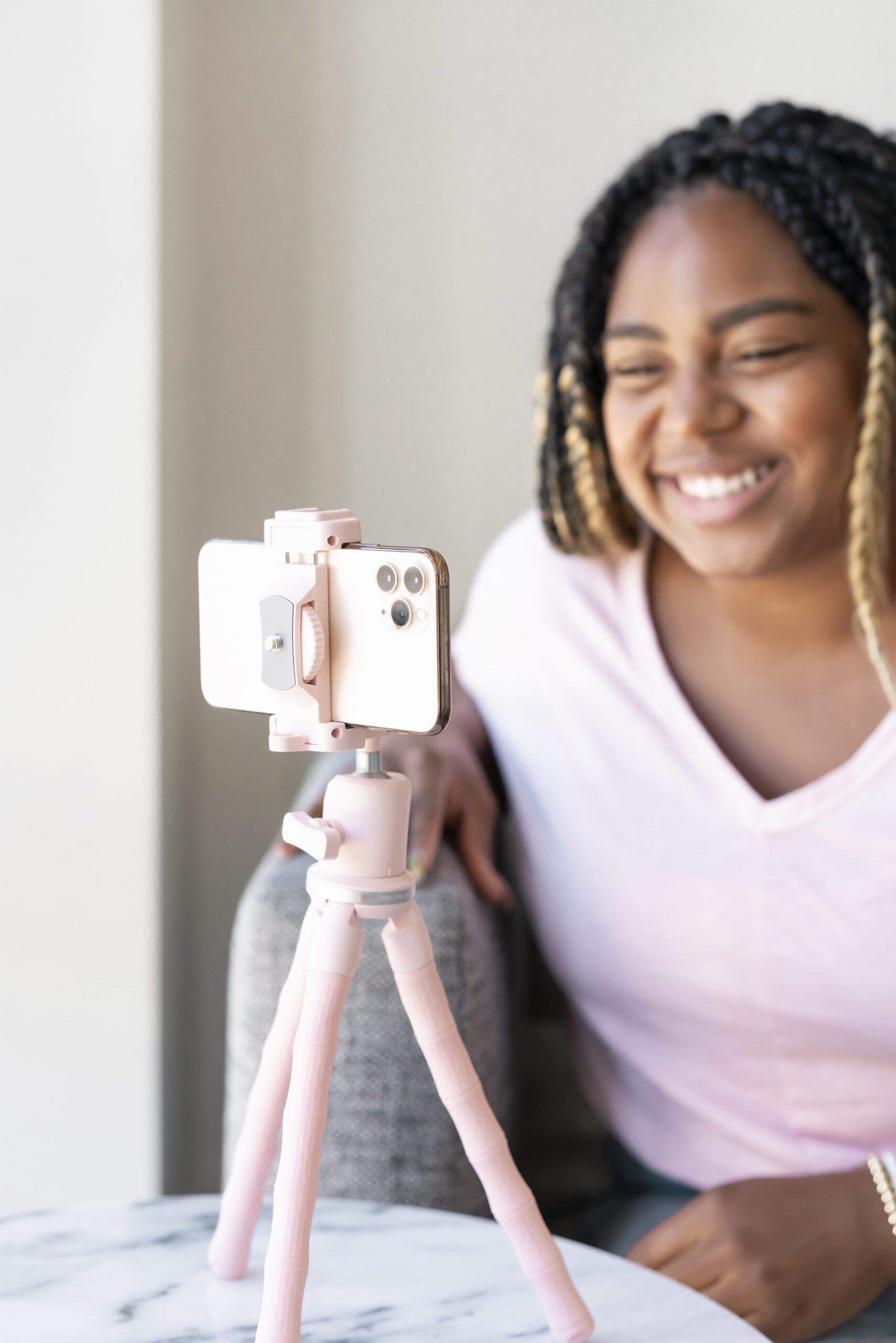
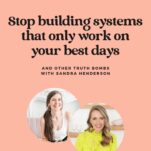
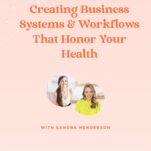
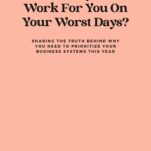
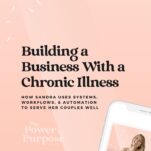
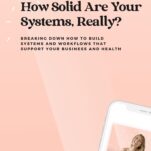
+ show Comments
- Hide Comments
add a comment